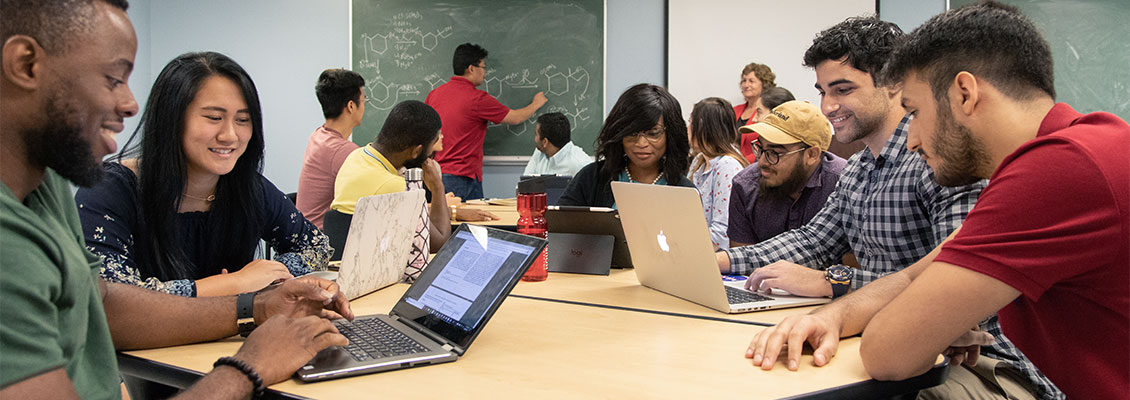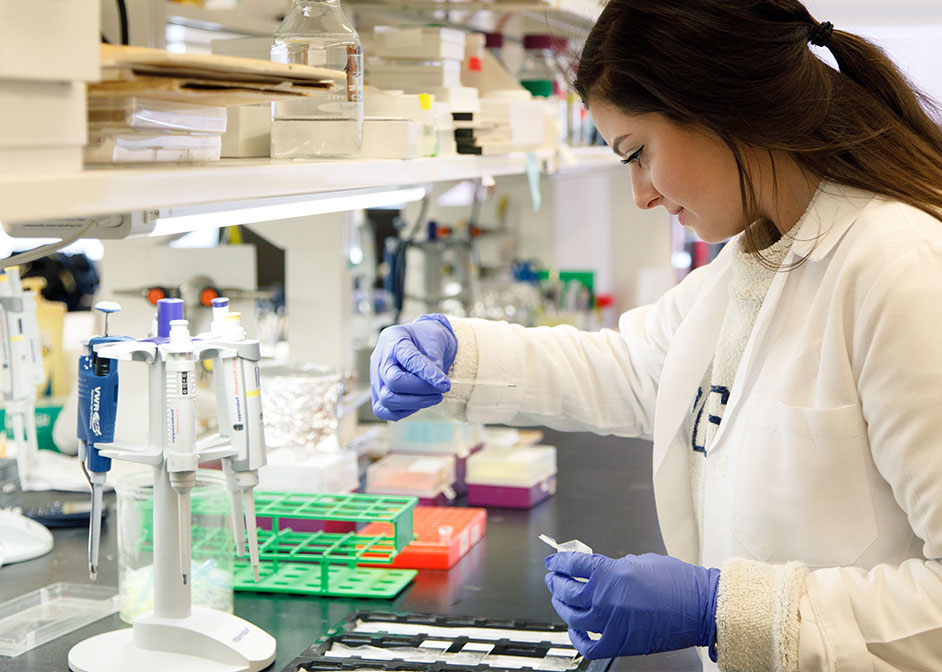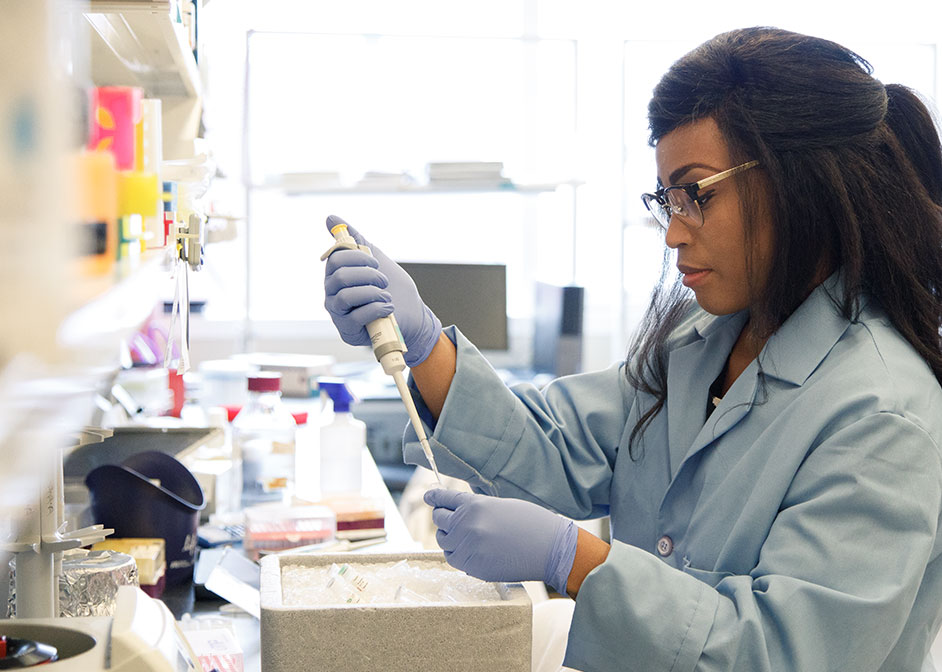M.S. in Biology with Graduate Certificate in Biomedical Sciences

Enhance your Health Profession Program Applications
Program Overview
The Department of Biology & Biochemistry in the College of Natural Sciences and Mathematics offers a non-thesis master’s degree in biology with a Graduate Certificate in Biomedical Sciences.
This one-calendar-year program provides students with additional preparation for admission into professional degree programs in medicine, dentistry, and allied health professions. However, it is not meant to fulfill the prerequisite course requirements for professional schools.
In order to allow students to enter Medical School as soon as they have completed this program, the program is structured to start in a Summer semester and to run through the following Fall and Spring semesters. Therefore, the program only admits students for the summer term. Students will graduate by the end of the following spring semester.
Program provides:
- Graduate-level coursework in relevant subject areas
- Research and internship opportunities
- Co-curricular activities for exploring various healthcare professions and the application process for professional degree programs
- Individualized advisement for educational and career planning.
Pathway Agreement for Medical School Interview
The Master of Science in Biology with Graduate Certificate in Biomedical Sciences Program has established a mutually beneficial relationship with the Tilman J. Fertitta Family College of Medicine (COM) through a Memorandum of Understanding (MOU) between TJFFCOM and the College of Natural Sciences and Mathematics (NSM) at the University of Houston. As part of this MOU, graduates of the program will qualify for automatic interview invitations* when they apply for admission to the COM, if they meet the following criteria:
- Satisfy all requirements for consideration for admission to medical school per criteria set by the Texas Medical and Dental Schools Application Service (TMDSAS) and COM
- Be a U.S. citizen or permanent resident
- Submit TMDSAS application and secondary application for the COM (within two weeks of invitation to apply) by the posted deadlines.
- Complete the graduate program curriculum and satisfy all program requirements with at least a 3.70 grade point average, with no grade lower than a “B”
- Score in the 70th percentile* or above on the Medical College Admissions Test (MCAT) taken within the past five years
- As indicated in TMDSAS application and COM secondary application, alignment to COM mission, including demonstrated and stated interest in community health and commitment to becoming primary care physicians
* The total number of automatic interviews will be capped at 10% of the incoming class or 6 interview spots based on current enrollment limit at the COM. This number will increase when the COM increases its enrollment numbers.
** Please note that the actual MCAT score may vary depending on when the exam was taken. The percentile will be indicated on the official score report.
Students complete the 30-hour M.S. within a calendar year, by taking the following courses:
- Certificate consists of 18 credit hours to include:
- 4 core classes (12 credit hours):
- BIOL 6351 Integrated Anatomy and Physiology; 3 credit hours
- BIOL 6352 Molecular Mechanisms of Disease; 3 credit hours
- BIOL 6355 Introduction to Health Systems; 3 credit hours
- BIOL 6356 Medical Ethics; 3 credit hours
- 6 credit hours of practicum:
- Internship in Community Health
- Laboratory Research under Faculty Supervision
(Students can choose 6 hours of internship, 6 hours of research, or 3 hours of each.)
- 4 core classes (12 credit hours):
- Elective courses consist of 12 credit hours. Examples of electives are:
- BCHS 6361: Clinical Biochemistry
- BIOL 6315: Neuroscience
- BIOL 6320: Molecular Biology
- BIOL 6323: Immunology
- BIOL 6330: Molecular Basis of Infectious Diseases
- BIOL 6333: Advanced Microbial Physiology
- BIOL 6354: Endocrinology
- BIOL 6374: Cell Biology
- BIOL 6384: Developmental Biology
- BIOL 6397: Cellular Pathobiology
Typical course load for completion of the M.S. with Certificate consists of 12 hours in each of the Fall and Spring semesters, and 6 hours in the Summer. The practicum requirement is fulfilled by performing an internship in each of the Fall and Spring semesters. Co-curricular activities include guidance with application and interview processes for medical and dental schools, or other health-related programs.
The list of opportunities in a given semester may vary depending on the availability of the mentors.

A) Research Internships under Supervision of a Faculty Member in the Department of Biology & Biochemistry:
- Tasneem Bawa-Khalfe: Post-translational Modifications, Ubiquitin/SUMO, Chromatin Remodeling, Cell-Cell Adhesion, Cancer Metastasis
- Brigitte Dauwalder: Signaling in the Blood-Brain Barrier
- Stuart Dryer: Physiological and Pathophysiological Processes in the Kidney
- Tony Frankino: Regulation and Integration of Organ Growth
- Dan Graur Theoretical Molecular Evolution and Bioinformatics
- Erin Kelleher Evolutionary genomics of reproductive biology and small RNA mediated silencing in Drosophila
- Seema Khurana: Regulation of Epithelial Cell Biology and Pathobiology by Actin and Actin-Binding Proteins
- Arne Lekven: How Cell Signaling Controls the Subdivision and Pattern of Cell Types in the Vertebrate Brain
- Chin-Yo Lin: Mechanisms of Transcriptional Regulation by Estrogen Receptor Alpha
- Yu Liu: Mechanisms of Heart Development and Diseases
- Rich Meisel: Computational Biology, Genomics, and Bioinformatics
- Chandra Mohan: Molecular Mechanisms and Markers of Lupus Nephritis (Joint appointment Biomedical Engineering/Biology & Biochemistry)
- Weiyi Peng: Interplay between Cancer and the Immune System, Cancer Immunotherapy
- Amy Sater: Vertebrate Neural Development, Regeneration, and Repair
- Bob Schwartz: Molecular Development and Drug Discovery
- Mehmet Sen: Molecular Basis of Receptor Function and Ligand Interactions in Health and Disease
- Margaret Warner: Ligand-activated Nuclear Receptors in Health and Disease
- William Widger: Antibiotic Resistance and Bacterial Dormancy
B) Community Health Internships and Other Opportunities:
- Legacy Community Health
- Health Advocate Student Intern (HASI) Program, under the supervision of Felicia Latson, Director, Programs, Social Determinants of Health, Behavioral Health.
- The Community Health Workers Initiative at UH under the supervision of Dan Price, Clinical Assistant Professor, The Honors College.
- The Behavior Opportunities Uniting Nutrition, Counseling & Exercise (BOUNCE) Program at UH under the supervision of Norma Olvera, Professor, Department of Psychological, Health and Learning Sciences.
- MD Anderson Cancer Center
- Radiation Oncology Department faculty at MDACC - In partnership with the Radiation Oncology Department at the MD Anderson Cancer Center, students participate in research internships with faculty members in research topics related to Radiation Oncology. Research internships are coordinated by Dr. Jillian Gunther, a faculty and physician scientist in the department.
- Social Determinants/Health Disparities Lab at UH under the supervision of Lorraine Reitzel, Associate Professor, Department of Psychological, Health, and Learning Sciences.
- UH Tilman J. Fertitta Family College of Medicine, Community and Population Health Research, Dr. Winston Liaw, Chair; Dr. LeChauncy Woodard, Founding Director of Humana Integrated Health System Sciences Institute; Dr. Omolola Adepoju, Research Director, Humana Institute.
Use UH’s tuition calculator for an estimation of the program costs. Note that an additional program fee in the amount of $2,000/year is added to the regular tuition/fees ($400 in the summer, $800 in each of the fall and spring semesters). In addition, the tuition cost per semester credit hour (SCH) is increased by $111.36/SCH once the certificate plan is open in the graduating semester.
We strongly recommend that U.S. citizens fill out the FAFSA (Free Application for Federal Student Aid). Texas residents with demonstrated financial needs through completion of the FAFSA application may be eligible for the University of Houston Graduate School Fund, to help defray the cost of tuition and fees.
The list below represents the required criteria for consideration for admission. All applications receive a holistic review. Having met the GPA and test scores minimum standards does not guarantee an automatic admission.

- Completion of undergraduate degree with a major in biology, biochemistry, or equivalent.
- Minimum cumulative GPA of 3.0 (out of 4.0) in the last 60 hours of course work.
- Target competitive GRE (combined quantitative and verbal) or MCAT scores of 305 and 500, respectively.
- Individuals who graduated from the University of Houston with a cumulative GPA of 3.4 or higher can be considered for admission without GRE or MCAT scores.
- For applicants who obtained their undergraduate degrees from institutions where English was not the language of instruction, the University requires an overall score of 79 or 6.5 on the TOEFL or IELTS English proficiency tests, respectively (see English Language Proficiency Requirements for exceptions).
Prerequisites
Completion of undergraduate junior level courses in Biochemistry and at least one of the following: Genetics, Molecular Biology, or Cell Biology no later than the Spring semester prior to entry in the graduate program. Applicants who are taking these courses in the Spring semester prior to program entry will need to provide an up-to-date transcript showing enrollment in the courses.
Application Checklist
- Transcripts of ALL previous college work
- GRE general test or MCAT score report (DAT scores are not accepted)
- TOEFL or IELTS score report (international applicants)
- Three (3) letters for recommendation
- Minimally two letters need to be from science faculty; one letter can be from non-science faculty or supervisor of shadowing, volunteering, research, or employment activities.
- We do not accept letters of recommendation via Interfolio.
- Personal statement outlining future goals and expectations from the program
- Resume (not required but highly recommended)
Request the Educational Testing Service to send the GRE and TOEFL scores electronically to the University of Houston (code 6870). MCAT scores should be sent electronically by the Association of American Medical Colleges (code 68648).
The online application via ApplyWeb will allow applicants to submit personal and academic information, upload documents (transcripts, personal statement and test scores), and give the names and contact information of their referees, including their business email addresses (a personal email address is not allowed). An email is automatically generated to the referees to request their letters of recommendation to be uploaded via the online portal. We are not accepting letters of recommendation via Interfolio. Complete applications, including letters of recommendation and test scores, must be received by the deadlines given below.
Find more information about the application process on the How to Apply page on the NSM website.
The application will open in October for consideration of admission for the following summer term.
Apply NowDeadline for complete international application: March 29
Deadline for complete domestic application: March 29
For More Information
Contact
Wendy Johnson
713-743-6987
wajohns4@central.uh.edu
Program Co-Directors
Chin-Yo Lin, Ph.D.
Jenifer Gifford, Ph.D.